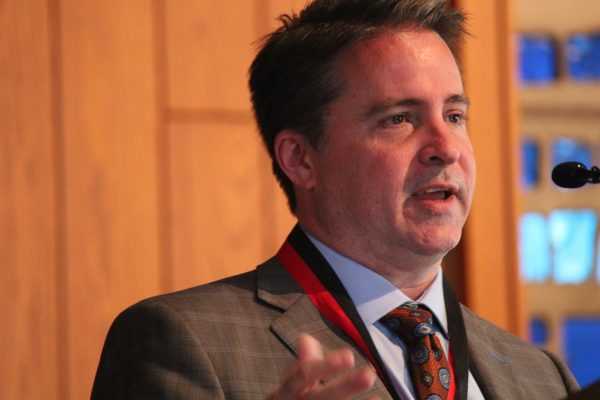By Ed Thompson
I love Big Tent. That’s our denomination’s educational event/family reunion that happens every other year between General Assembly meetings. This year at Big Tent, I had something happen to me that has never happened before. I was the only white man (OK, old white man) at a table of eight. Maybe that has happened to me before, but if it has, I don’t remember it. (This may have something to do with the old part in the previous description.)
When I realized what was happening, I thought, “This is the future.” It will be the future of our country. I hope it reflects the future of our denomination. It was me; two white women in their 20s; two people from Philadelphia, originally from Suriname (they looked to be older than me but it was hard to tell – I didn’t ask their ages); one woman in her 30s, living in San Francisco though originally from Cameroon; an African-American woman in her 20s, and another African-American girl who looked to be about 10 years old. I said a few things during our discussion, but mostly I listened. I think, no, I know that I have a lot to learn.
 Earlier at Big Tent, I had the chance to listen to Robert P. Jones (pictured), the author of The End of White Christian America, a book that won the Grawemeyer Award in Religion earlier this year. I suppose you could sum up his research by saying that the country is changing. He posits that much of the anger we see in what passes for political discourse today is actually an expression of grief. Our old way of life has died or is dying. He also suggested the high level of support for Donald Trump by white evangelical voters reflects a sense of bargaining, another of the stages of grief.
Earlier at Big Tent, I had the chance to listen to Robert P. Jones (pictured), the author of The End of White Christian America, a book that won the Grawemeyer Award in Religion earlier this year. I suppose you could sum up his research by saying that the country is changing. He posits that much of the anger we see in what passes for political discourse today is actually an expression of grief. Our old way of life has died or is dying. He also suggested the high level of support for Donald Trump by white evangelical voters reflects a sense of bargaining, another of the stages of grief.
The demographic changes in our country are irreversible. We have a choice, though, in how we respond to these changes. It might be possible to make policies that attempt to hold back these changes since the people who vote are quite different than the country as a whole. Whether that would be a good thing or a bad thing, though, is another question.
As a church, we also have a choice as to what story we tell, how we interpret what we see happening around us. Do we see decline and decay, an erosion of biblical values? Or do we see God doing a new thing? Jones says the immigrants coming to this country are composed of a higher percentage of Christians than our current population is. They are actually making us a more Christian country.
This also got me to thinking about what is the story we tell about our local churches. I mostly hear stories about loss of membership, a longing for the good old days when the church was full and the local economy was booming. While that’s true in one sense, is that the only way to interpret what we see happening around us? Maybe God is doing a new thing. Strike the maybe. God is doing a new thing. God is still at work in our communities and our churches. It’s up to us to keep up with God, to follow Jesus, to minister to the people around us. We can tell a story that is full of anger and judgement, or we can tell a story that is full of hope and grace. We can still teach our children the song I learned back in Sunday school – “Jesus loves the little children, all the children of the world. Red and yellow, black and white, they are precious in his sight. Jesus loves the little children of the world.” We can sing that. We can believe that. We can also work for public policies that reflect those words.
 I’ve also been thinking about what story do we tell about ourselves? Are we angry? Angry at God? Angry at immigrants? Angry at politicians? Or are we hopeful? I want to be hopeful. I want to believe God is still at work and still has work for me to do. I want to listen and learn. I want to hear the stories of God’s goodness as well as the stories of struggle from people who look different than I do. They have obviously had different experiences than I have, and frankly, they have faced far more difficult struggles than I ever did.
I’ve also been thinking about what story do we tell about ourselves? Are we angry? Angry at God? Angry at immigrants? Angry at politicians? Or are we hopeful? I want to be hopeful. I want to believe God is still at work and still has work for me to do. I want to listen and learn. I want to hear the stories of God’s goodness as well as the stories of struggle from people who look different than I do. They have obviously had different experiences than I have, and frankly, they have faced far more difficult struggles than I ever did.
I hope I can use what I know and what I have learned to help the people around me grow in their faith. I hope I can help point them to Jesus. It’s a different world, but it’s the same God, the God who loves people who look a lot different than I do. At least that’s what I heard from the other people at the table at Big Tent.
